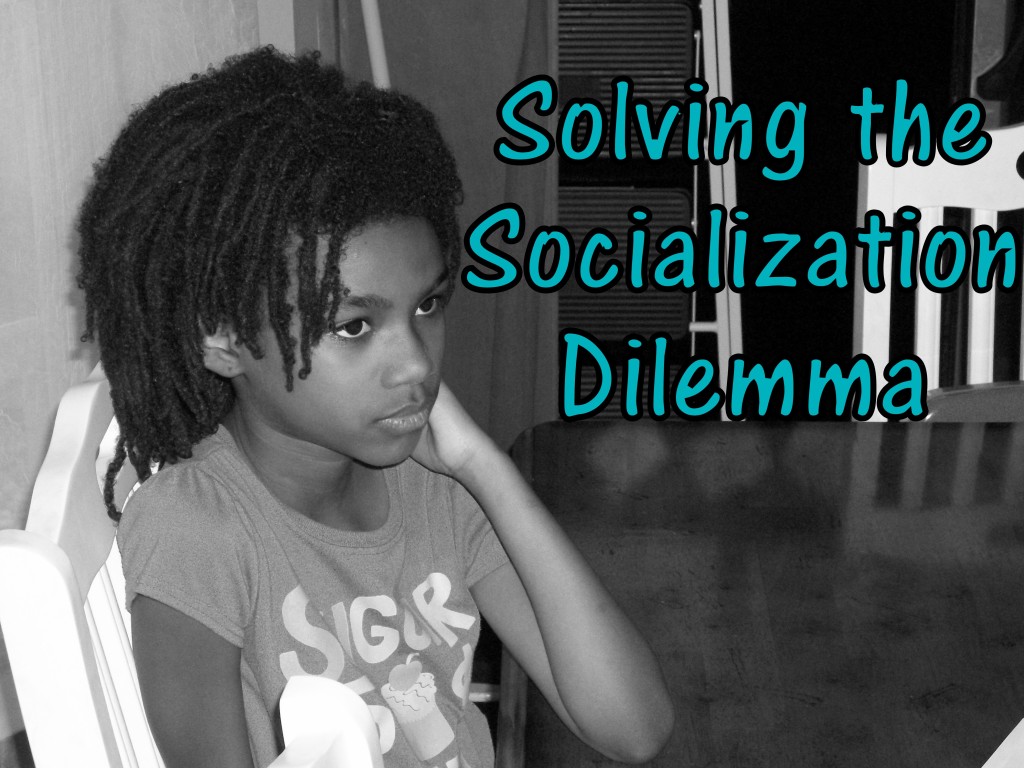
If you’ve ever mentioned the word homeschooling in public, you’ve probably heard at least one person express concern about “socialization”. True, these well-meaning individuals may not use the actual word, but they probably say things like this:
“Don’t they need to be around some other children their own age?”
“They need to get away from Mommy and Daddy and see what it’s really like out there.”
“If you don’t let them to get used to other kids, they’re not going to know how to talk to people.”
“You’re sheltering them from the real world by keeping them at home with you.”
It can be tempting to respond to these concerns with a snarky answer. Maybe something like “You spent time around other children and you clearly don’t know how to talk to people yet.” (Okay, that might be just MY personal fantasy response.) But there’s a hint of truth behind those statements.
All children need socialization, including homeschoolers. Interestingly, the definition of the word “socialize” is “to make social; especially, to fit or train for a social environment”. The difference for homeschooling families is in how we choose to provide training that for them.
Yes, Homeschoolers Need Socialization
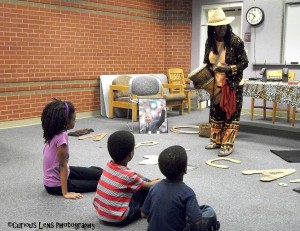
I’ve heard some homeschooling parents argue that children don’t need socialization with other children at all. They might say that kids get plenty of socialization by talking to their neighbors and acquaintances through the course of the day. Speaking as a homeschooling graduate, I have to respectfully disagree with that sentiment.
I was taught at home from the age of 11 until graduation and I spent quite a bit of time talking with adults on a regular basis. In fact, I eventually became more comfortable with adults than I was with my peers. That’s fine in itself. The problem came, though, when I attended the first day of college. I took one step into the Student Lounge and nearly had a panic attack. I hadn’t been around a large group of people my own age in years and it was a terrifying experience. So I do believe that homeschooled children need socialization with all kinds of people: adults, older kids, younger kids, and their peers. Talking to the cashier at the grocery store just isn’t going to cut it.
Creating Socialization Opportunities Outside the Home
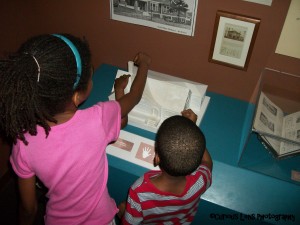
How do we find ways to get our children out and around during the course of homeschooling? Simple. Make it part of the school day. Check out the activity calendar for any local attractions in your area and make it a point to visit on days that are set aside for children or homeschoolers. We’ve gotten to attend museum days and public storytelling events around our area and our kids have enjoyed being out and around others. We also belong to an active homeschooling group that arranges park days, support meet-ups, and field trips.
During these activities, the kids have learned some valuable things they can’t at home – how to stand in line, how to sit quietly in a group (even when others are talking), how to speak up to ask for assistance when needed, and how to listen despite distractions. These are important skills that they’ll need throughout life.
Encouraging Socialization Inside the Family
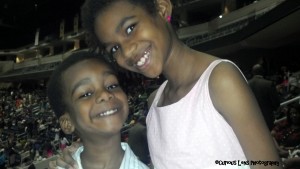
Of course, all this time training our children to interact with other people won’t be worth a thing if they can’t interact well with each other. Good socialization habits begin in the home and, as parents, it’s our job to help our kids learn how to treat one another with respect, settle disputes, and show concern. Our two oldest children, Tigger and Pooh, have gotten into several spats over the years. He looks up to her, but doesn’t really want her to know it. She wants his approval, but tries to keep that a secret. It’s a never-ending saga.
Jay caught on to the pattern between the two of them early on and he’s worked with them constantly, trying to help them speak to each other honestly and with kindness. As a result, the daily squabbles have dwindled down to a couple times a week. We’re confident that, with time and training based on Bible principles, their relationship will become stronger. (We fully expect a similar dynamic between Roo and Piglet in the future, though.)
Solving the socialization dilemma doesn’t mean separating our kids from society and it doesn’t mean dropping them off into a group of their peers without preparation. We can do it by making opportunities to train them for social activities. And all that takes is being an involved homeschooling parent.
This post is part of the “Homeschooling and the S-Word (Socialization)” linkup at iHomeschool Network! Click over to read great posts about homeschooling and socialization from our fellow bloggers!
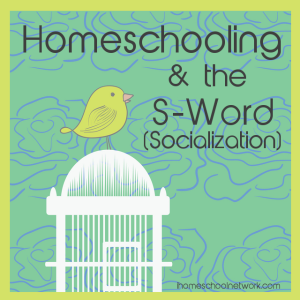
Having my kids in public and private school and just starting homeschool I do realize there IS a ‘socialization’ problem. That problem or disconnect is (as noted by my teenager who came from public school/private school) is that her homeschooled friends don’t know the ‘social clues’ that she took for granted while in regular school. When a kid goes to a large school with lots of different people they learn the things ‘not to say’, can sum up what the kid is ‘into’ by the way they dress or carry themselves, they know what’s ‘cool’ and not cool to do. She noted that her homeschooled friends seemed rather ‘naive’ and didn’t realize that to her and her public school peers the way they talked or what the wore, or their mannerisms were not the norm. Now that’s not to say that her ‘social’ cues are off when she goes to another school, is in a new setting, but coming from a ‘teen’ in the mix she made sense.
Yes! Social cues are very important and they are definitely not things that you can teach in a classroom. I had a good friend who was homeschooled from birth and she never had to be around peers at all. She had some habits that were, shall we say, unusual. And she’s fairly socially awkward to this day. All kids (public schoolers and homeschoolers) do need to learn those social coping skills.
I’ve never experienced an issue. My kids do interact with others in a normal daily life, of course. But we attend cosplay conventions, religious conventions. rock concerts, homeschool days at the Orlando museums and such. My kids are always in large crowds. I don’t know that this ads to their ability to develop social skills to fit into a community (be socialized) since that’s not their community (except the religious conventions), but it is a lot of fun and they certainly are accustomed to being around tens of thousands of people at a time.
Then again, my kids who never experienced those things were fine to grow up and suddenly be a part of those things. Oh.. wait.. they’re Disney kids. They’ve always been trapped in crowds. LOL!
Great post!
Yes, that should say “adds”. I love typos.
Hee hee! That’s great! My experience was, I think, partly due to the fact that I was an only homeschooled child. (My older brother had moved out by the time I began homeschooling.) So I was by myself a lot, unless I was with adults. I think if I had siblings around my same age then the adjustment wouldn’t have been quite so difficult.
I loved your post. I have homeschooled for ten years now. We have always been involved with homeschooling support groups that have run classes, field trips, and park days. My children have learned to interact with people of all ages, from infants to adults. I am proud that when mixed in with a group of public schoolers, they will interact with everyone and often help out a younger child. Are they naïve? Perhaps. But what is wrong with that? My 12 and 10 year old daughters and 15 yr old son have no idea what twerking is nor have they seen that recent performer’s dance. I don’t really believe that it is naïve; I believe I am protecting my children from some negative influences. There is nothing wrong with providing positive and loving role models, instead of allowing peers of the same age to set the example for our children.
Oh, I absolutely agree about the need to be selective in choosing role models. Interacting with kids of all ages is great! And that would have been helpful for me as a child too. I just didn’t get that. I was almost purely around adults, which is not the healthiest environment for a kid.
Our kids are probably naive too. They don’t know anything about any popular musicians or dances or fashion trends. And I’m more than fine with that. There’s plenty of time for them to become acquainted with those things if they choose, when they get older. I’m all for protecting them from negative influences – until they are equipped to handle them. That’s what parents are here for! 🙂
When we first took the kids out of school, all we heard was ‘socialisation’. Like a puppy training thing! I am naturally chatty and social, so I am not sure why people thought I would be keeping them at home on my own all day everyday. Can you even imagine what that would be like???
The thing I found hard was learning the balance. I want to do all the trips, play dates etc but somewhere we needed to learn to fit in the literacy etc. So, we have to pick and choose carefully and we can’t do everything.
I think it is massively important that the children learn and play with other children but I don’t think they need someone elses idea of cool or not cool, I don’t think they need to grow up too fast and I definitely don’t want them seeing things like twerking. We want them to find their own cool, if that makes sense. My little lad has long hair and loves to dress up, he would die in school, if he wasn’t bullied to death. He started reception at age 4 because of his August birthday and hated school uniform, he wanted to be a dinosaur or a pirate or a Jedi knight and he wasn’t allowed. At FOUR! His cool is dressing up and reading stories and acting it out. He will probably be on the stage. My daughter is more conventional, pink and pretty and she is fine!
We have sessions of free play that we attend with our friends, eg Monday afternoons is den building in our local woods. We let them alone and they work out their own relationships and just muck around. Then on other days there are more organised trips to museums or whatever. Our library is about to offer reading groups especially for home ed kids. Big deal here in the UK where it home ed is often frowned upon!
We noticed when there were some school children playing that our children were less concerned with competition (the school kids were trying to set one up) and more concerned with co-operation, working together to build their den, pooling ideas and skills. We hadn’t really noticed but they have developed those skills on their own. Somehow, my shy daughter with a speech impediment was appointed spokesperson and said to kids twice her age, ‘We not want a compytishin but if you help us wiv ours we will help you wiv yours.’ I was so proud of her and of all of them. For me, that says it all, they are confident, co-operative and happy in the company of others and that is good socialisation. My children struggled with socialisation at school but excel at it now they are home.
Thanks so much for sharing! It sounds like your kids are learning how “to be social” just fine. That’s what we really want for our kids – a good balance of understanding how to interact well with others without letting what they see affect how they behave. I think that’s true self-confidence, which is probably one of the most important life skills children need.